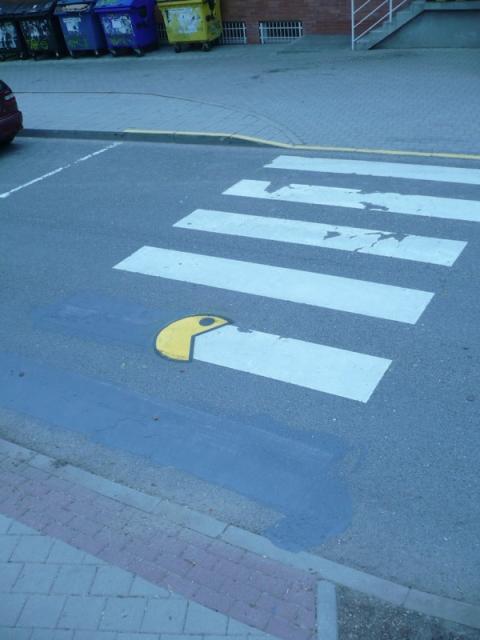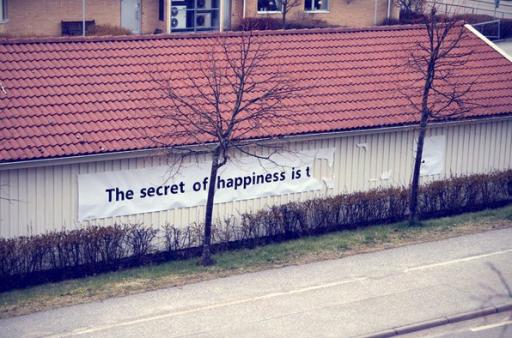The Null Device
Posts matching tags 'creativity'
2013/11/2
Tim Minchin has written a short piece about the (culturally conditioned) tendency to equate being “creative” and free-spirited with a woolly, mystical anti-rationalism, in an introduction to a collection of Australian science writing:
I've only been to Portland once, but it's a great city - its population a paragon of liberalism and artiness, sporting more tattoos than you could point a regretful laser at, and boasting perhaps a higher collective dye-to-hair ratio than anywhere on earth. Great music, great art, wonderful coffee … it's my kind of town. Except, the residents recently voted - for the fourth time since the 1950s - against adding fluoride to the water supply. It's as if a mermaid on one's lower back is an impediment to sensible interpretation of data, or perhaps unkempt pink hair acts as a sort of dream catcher for conspiracy theories.
As an artist who gets aroused by statistics - among other things - I find this deeply troubling. But I reckon (and yes, I only reckon: one of many advantages of being a not-Nobel-laureate is that I may hypothesise with relative impunity) that the apparent relationship between artiness and anti-science is a result of people acting out cultural expectations and subscribing to popular myths, rather than a genuine division of personality type or intellect. I wonder if artists identify themselves as spiritual (whatever that means) and reject materialism for the same reason they might wear a beret or take up smoking: it's an adherence to a perceived stereotype, rather than a fundamental feature of the creative brain.
Science is not the opposite of art, nor the opposite of spirituality - whatever that is - and you don't have to deny scientific knowledge in order to make beautiful things. On the contrary, great science writing is the art of communicating that ''awe of understanding'', so that we readers can revel in the beauty of a deeper knowledge of our world.
2012/11/29
Meet Nakamatsu Yoshiro, also known as Dr. NakaMats, the veteran Japanese inventor with 3,377 patents to his name and a stream of inventions dating back to 1952, when he invented an early type of floppy disk. Nakamatsu's floppy disk (a wood veneer disc designed to replace punched cards) was not immediately successful, and neither was the digital watch he invented a few years later, though both ideas found their place decades later. (IBM actually licensed Nakamatsu's patents for the floppy disk in 1969, despite having come up with it independently.) Nakamatsu followed these up with a steady stream of inventions; a few have been enormously successful, funding both his elaborate residence (a high-rise building shaped like a floppy disk) in Tokyo and his more out-there inventions:
Among his other creations (he will earnestly tell you) are the CD, the DVD, the fax machine, the taxi meter, the digital watch, the karaoke machine, CinemaScope, spring-loaded shoes, fuel-cell-powered boots, an invisible “B-bust bra,” a water-powered engine, the world’s tiniest air conditioner, a self-defense wig that can be swung at an attacker, a pillow that prevents drivers from nodding off behind the wheel, an automated version of the popular Japanese game pachinko, a musical golf putter that pings when the ball is struck properly, a perpetual motion machine that runs on heat and cosmic energy and...much, much more, much of which has never made it out of the multiplex of his mind.Dr. NakaMats is 84, though expects to live (and keep inventing) for another 60 years; he puts this down to his carefully controlled lifestyle regimen, which includes limiting sleep to only six hours a night, eating a special low-calorie diet (including a supplement, naturally, of his own invention, Dr. NakaMats' Rebody 55), as well as going on long underwater swims to starve his brain of oxygen, allowing inspiration to strike.
Dr. NakaMats is not without his detractors; some point out exaggerations in his claims (for example, the taxi meter, which he claims to have invented was patented in the US before he was born, and his claims to a perpetual motion machine, if taken at face value, are not compatible with the second law of thermodynamics). And none other than Kawakami Kenji, the founder of the absurdist (and militantly noncommercial) invention praxis of chindogu, has criticised Nakamatsu for his focus on money and self-glorification:
“Real inventions open our hearts and minds, enrich our lives, bring us closer together,” says countryman Kenji Kawakami, the anarchic founder of chindogu—intentionally silly and impractical creations that are not useful, patented or for sale. “Dr. NakaMats is all about money and fame and ego.”
2012/2/4
A French blog named Tout Bon has a gallery of the most interesting street art of 2011 (for varying definitions of "street art"):





And plenty more...
2011/12/31
A few random odds and ends which, for one reason or another, didn't make it into blog posts in 2011:
- Artificial intelligence pioneer John McCarthy died this year; though before he did, he wrote up a piece on the sustainability of progress. The gist of it is that he contended that progress is both sustainable and desirable, for at least the next billion years, with resource limitations being largely illusory.
- As China's economy grows, dishonest entrepreneurs are coming up with increasingly novel and bizarre ways of adulterating food:
In May, a Shanghai woman who had left uncooked pork on her kitchen table woke up in the middle of the night and noticed that the meat was emitting a blue light, like something out of a science fiction movie. Experts pointed to phosphorescent bacteria, blamed for another case of glow-in-the-dark pork last year. Farmers in eastern Jiangsu province complained to state media last month that their watermelons had exploded "like landmines" after they mistakenly applied too much growth hormone in hopes of increasing their size.
Until recently, directions were circulating on the Internet about how to make fake eggs out of a gelatinous compound comprised mostly of sodium alginate, which is then poured into a shell made out of calcium carbonate. Companies marketing the kits promised that you could make a fake egg for one-quarter the price of a real one.
- The street finds its own uses for things, and places develop local specialisations and industries: the Romanian town of Râmnicu Vâlcea has become a global centre of expertise in online scams, with industries arising to bilk the world's endless supply of marks, and to keep the successful scammers in luxury goods:
The streets are lined with gleaming storefronts—leather accessories, Italian fashions—serving a demand fueled by illegal income. Near the mall is a nightclub, now closed by police because its backers were shady. New construction grinds ahead on nearly every block. But what really stands out in Râmnicu Vâlcea are the money transfer offices. At least two dozen Western Union locations lie within a four-block area downtown, the company’s black-and-yellow signs proliferating like the Starbucks mermaid circa 2003.
It’s not so different from the forces that turn a neighborhood into, say, New York’s fashion district or the aerospace hub in southern California. “To the extent that some expertise is required, friends and family members of the original entrepreneurs are more likely to have access to those resources than would-be criminals in an isolated location,” says Michael Macy, a Cornell University sociologist who studies social networks. “There may also be local political resources that provide a degree of protection.”
- Monty Python's Terry Jones says that The Life Of Brian could not be made now, as it would be too risky in today's climate of an increasingly strident religiosity exercising its right to take offense:
The 69-year-old said: "I took the view it wasn't blasphemous. It was heretical because it criticised the structure of the church and the way it interpreted the Gospels. At the time religion seemed to be on the back burner and it felt like kicking a dead donkey. It has come back with a vengeance and we'd think twice about making it now."
- The Torygraph's Charles Moore: I'm starting to think that the Left might actually be right:
And when the banks that look after our money take it away, lose it and then, because of government guarantee, are not punished themselves, something much worse happens. It turns out – as the Left always claims – that a system purporting to advance the many has been perverted in order to enrich the few. The global banking system is an adventure playground for the participants, complete with spongy, health-and-safety approved flooring so that they bounce when they fall off. The role of the rest of us is simply to pay.
- The sketchbooks of Susan Kare, the artist who designed the icons, bitmaps and fonts for the original Macintosh, and went on to an illustrious career as a pixel artist (Microsoft hired her to do the Windows 3.x icons, and some years ago, Facebook hired her to design the virtual "gifts" you could buy for friends.) The sketchbooks show her original Macintosh icons, which were drawn by hand on graph paper (because, of course, they didn't have GUI tools for making icons back then).
- How To Steal Like An Artist: advice for those who wish to do creative work.
- The street finds its own uses for things (2): with the rise of the Arduino board (a low-cost, hackable microcontroller usable for basically anything electronic you might want to program), anyone can now make their own self-piloting drone aircraft out of a radio-controlled plane. And it isn't actually illegal in itself (at least in the US; YMMV).
- An answer to the question of why U2 are so popular.
2011/2/14
The Quietus has an interview with The Human League, (who have a new album coming out, apparently skipping the whole 80s synthpop nostalgia circuit and focussing on making dancefloor-oriented electronic music). Anyway, the interview includes an interesting assertion that boring places (like Sheffield, allegedly) produce more interesting music than exciting places (like London):
(Joanne:) But Sheffield isn’t just about that; obviously you’ve got the Arctic Monkeys as well. It’s a very, very arty town. It’s a bit dull...
(Susan:) I think it is because it’s a bit boring. There isn’t much going on. You only have to go across the Pennines to Manchester and suddenly you're in a different world; it’s very cosmopolitan. You come back to Sheffield and it’s a bit... boring! And I don’t think that’s necessarily a bad thing because it creates creativity.
But that’s why good bands don’t come from London. Ambitious bands move to London to become famous but that’s not the same thing... even during punk and post-punk when you had a lot of people coming through, a lot of these bands were more associated with places like Bromley, which are satellite towns or else they came from squatted communities where people couldn’t afford any of the entertainment options that London offered.
2009/10/1
Psychological experiments at the University of Amsterdam have found connections between romantic love and creative thinking and sex and analytical thinking:
The clever experiments demonstrated that love makes us think differently in that it triggers global processing, which in turn promotes creative thinking and interferes with analytic thinking. Thinking about sex, however, has the opposite effect: it triggers local processing, which in turn promotes analytic thinking and interferes with creativity.
Why does love make us think more globally? The researchers suggest that romantic love induces a long-term perspective, whereas sexual desire induces a short-term perspective. This is because love typically entails wishes and goals of prolonged attachment with a person, whereas sexual desire is typically focused on engaging in sexual activities in the "here and now". Consistent with this idea, when the researchers asked people to imagine a romantic date or a casual sex encounter, they found that those who imagined dates imagined them as occurring farther into the future than those who imagined casual sex.
A global processing style promotes creative thinking because it helps raise remote and uncommon associations. Consider, for example, the act of finding a gift for your partner. If we think about a gift while in a local mindset, then we’ll probably focus on more literal and concrete options, most of which involve a tangible object wrapped in colorful paper. We’ll probably consider the usual suspects, such as a watch, a book, or perfume. However, thinking about a gift more globally might inspire us to consider a gift as "anything that will make him/her happy". This may, in turn, bring to mind more diverse and original ideas, such as going on a joint vacation, writing a song, or cleaning and remodeling the house. Of course, this doesn’t mean we should always think globally. While local processing might interfere with creativity, it also promotes analytic thinking, which requires us to apply logical rules. For example, if you are looking for a piece of furniture in a big display according to a pre-defined list of criteria (e.g., size, color, price), a local mindset may help you find a match, by preventing you from being side-tracked by attractive but irrelevant options and by making you pay more attention to relevant details.I wonder how this ties into other things, such as holism and reductionism. Or wiether there's a correlation between short-term thinking and a prevalence of sexualised imagery/metaphors.
(via Mind Hacks) ¶ 2
2009/8/16
McSweeney's Internet Tendency has a detailed interview with underground comics author Daniel Clowes, in which he sheds light on his early career with Cracked! magazine (which he describes as being like methadone for MAD Magazine addicts, and reels off a comprehensive list of various MAD clones and their nebbish mascots), the genesis of Ghost World and its making into a film, the art of writing/drawing comics, and numerous other things:
I used to tell people I was a "comic-book artist," but they'd look at me as if I'd just stepped in dog shit and walked across their Oriental rug. I never knew what to call myself, but I was always opposed to the whole "graphic novelist" label. To me, it just seemed like a scam. I always felt that people would say, "Wait a minute! This is just a comic book!" But now, I've given up. Call me whatever you want.
Whenever a musician isn't happy with the quality of an early record and records it again with a "better" band, it's never better. It's like when Paul McCartney re-recorded "Eleanor Rigby" in the [1984] movie Give My Regards to Broad Street. Did "Eleanor Rigby" need to be re-recorded? The original work is connected to a specific moment of time; it's never going to become "better." Even when I do a new cover for one of my old books, it always seems sort of condescending to the material.
You just mentioned a movie I'm not familiar with: Scarlet Street. What is it about?
It's a strange movie. People always think of film noir as a genre of violent action. To me, noir is more about a state of anxiety and profound loneliness − an awareness of the quotidian grimness of the postwar world. Scarlet Street is about a poor, ugly loser [Edward G. Robinson] who gets hoodwinked by a horrible woman and her pimp, almost willingly so, since even this cheap thrill is preferable to his emasculated existence with his harridan wife.
The original version, directed by Jean Renoir, is even better. The [1931] movie is called La Chienne, which translates to "the bitch." I'm not even sure "the bitch," in this case, refers to the prostitute as much as life itself.
I never really considered Ghost World to be a teen film. To me, it was more about these two specific characters working through something −l something very personal to me. I wasn't necessarily trying to communicate with teenagers, and I never really imagined they would be as much of our audience as they have.
(via Boing Boing) ¶ 0
2009/1/9
Cory Doctorow, freelance writer and novelist, has written a short article on how to write productively in the age of ubiquitous distraction. The advice he gives is rather novel; he dismisses the usual advice about switching off one's internet connection, and is also scornful of the idea of ceremony, or of setting the right mood. (And understandably so; acknowledging the idea of there being a right mood or atmosphere for evoking one's inner muse could lead to finding excuses, consciously or subconsciously, for not actually doing anything.)
The single worst piece of writing advice I ever got was to stay away from the Internet because it would only waste my time and wouldn't help my writing. This advice was wrong creatively, professionally, artistically, and personally, but I know where the writer who doled it out was coming from. Every now and again, when I see a new website, game, or service, I sense the tug of an attention black hole: a time-sink that is just waiting to fill my every discretionary moment with distraction. As a co-parenting new father who writes at least a book per year, half-a-dozen columns a month, ten or more blog posts a day, plus assorted novellas and stories and speeches, I know just how short time can be and how dangerous distraction is.
Short, regular work schedule. When I'm working on a story or novel, I set a modest daily goal — usually a page or two — and then I meet it every day, doing nothing else while I'm working on it. It's not plausible or desirable to try to get the world to go away for hours at a time, but it's entirely possible to make it all shut up for 20 minutes. Writing a page every day gets me more than a novel per year — do the math — and there's always 20 minutes to be found in a day, no matter what else is going on. Twenty minutes is a short enough interval that it can be claimed from a sleep or meal-break (though this shouldn't become a habit). The secret is to do it every day, weekends included, to keep the momentum going, and to allow your thoughts to wander to your next day's page between sessions. Try to find one or two vivid sensory details to work into the next page, or a bon mot, so that you've already got some material when you sit down at the keyboard.
Leave yourself a rough edge. When you hit your daily word-goal, stop. Stop even if you're in the middle of a sentence. Especially if you're in the middle of a sentence. That way, when you sit down at the keyboard the next day, your first five or ten words are already ordained, so that you get a little push before you begin your work. Knitters leave a bit of yarn sticking out of the day's knitting so they know where to pick up the next day — they call it the "hint." Potters leave a rough edge on the wet clay before they wrap it in plastic for the night — it's hard to build on a smooth edge.
Realtime communications tools are deadly. The biggest impediment to concentration is your computer's ecosystem of interruption technologies: IM, email alerts, RSS alerts, Skype rings, etc. Anything that requires you to wait for a response, even subconsciously, occupies your attention. Anything that leaps up on your screen to announce something new, occupies your attention. The more you can train your friends and family to use email, message boards, and similar technologies that allow you to save up your conversation for planned sessions instead of demanding your attention right now helps you carve out your 20 minutes. By all means, schedule a chat — voice, text, or video — when it's needed, but leaving your IM running is like sitting down to work after hanging a giant "DISTRACT ME" sign over your desk, one that shines brightly enough to be seen by the entire world.
2008/11/10
Are you trying to write something (a novel, perhaps, or a thesis) but are having trouble sitting down and getting the words out? Write Or Die could be useful. It's a web toy which uses operant conditioning to force you to keep churning out the words, or else...
Consequences:I wonder how long this is integrated with other forms of productivity tools, such as software development project trackers. Perhaps we'll soon see a "Code Or Die" plugin for Trac?
- Gentle Mode: A certain amount of time after you stop writing, a box will pop up, gently reminding you to continue writing.
- Normal Mode: If you persistently avoid writing, you will be played a most unpleasant sound. The sound will stop if and only if you continue to write.
- Kamikaze Mode: Keep Writing or Your Work Will Unwrite Itself
2008/5/28
 Colors! is a program which turns a Nintendo DS into a pressure-sensitive drawing tablet/sketchbook. It includes translucency, and can be used to create some rather impressive drawings. There's a gallery here.
Colors! is a program which turns a Nintendo DS into a pressure-sensitive drawing tablet/sketchbook. It includes translucency, and can be used to create some rather impressive drawings. There's a gallery here.
Colors! is free, though, being homebrew, requires a homebrew loading cartridge.
2008/4/28
Clay Shirky, author of Here Comes Everybody, posits an interesting theory: that entertainment television, an arguably stupefying medium, arose in the 20th century as a temporary coping mechanism for dealing with a surplus of free time and cognitive capacity, a way for people to harmlessly manage free time they had no traditional uses for. A parallel he quotes was the explosion in consumption of gin (in those days a disreputable, highly intoxicating drink) during the mass migration from the countryside to the cities in Britain:
The transformation from rural to urban life was so sudden, and so wrenching, that the only thing society could do to manage was to drink itself into a stupor for a generation. The stories from that era are amazing-- there were gin pushcarts working their way through the streets of London.
And it wasn't until society woke up from that collective bender that we actually started to get the institutional structures that we associate with the industrial revolution today. Things like public libraries and museums, increasingly broad education for children, elected leaders--a lot of things we like--didn't happen until having all of those people together stopped seeming like a crisis and started seeming like an asset.Television, Shirky argues, fulfils the same role. During the 20th century, a majority of the population found itself with something they didn't have before: free time. Since there was no use for this, it was more of a crisis than an opportunity, and once again, society turned to an intoxicant as a means of control:
If I had to pick the critical technology for the 20th century, the bit of social lubricant without which the wheels would've come off the whole enterprise, I'd say it was the sitcom. Starting with the Second World War a whole series of things happened--rising GDP per capita, rising educational attainment, rising life expectancy and, critically, a rising number of people who were working five-day work weeks. For the first time, society forced onto an enormous number of its citizens the requirement to manage something they had never had to manage before--free time.
And what did we do with that free time? Well, mostly we spent it watching TV.
We did that for decades. We watched I Love Lucy. We watched Gilligan's Island. We watch Malcolm in the Middle. We watch Desperate Housewives. Desperate Housewives essentially functioned as a kind of cognitive heat sink, dissipating thinking that might otherwise have built up and caused society to overheat.Now, Shirky claims, society is figuring out ways to use surplus cognitive capacity more productively than by watching sitcoms. With the internet, people are starting to turn the television off and use their time, if not more productively, more interactively. This can take the form of amateur collective efforts such as Wikipedia or of pasting captions onto photographs of cats or playing multiplayer games. (Granted, in this early stage, even contributions to Wikipedia often are about TV shows, but this will probably pass):
And television watching? Two hundred billion hours, in the U.S. alone, every year. Put another way, now that we have a unit, that's 2,000 Wikipedia projects a year spent watching television. Or put still another way, in the U.S., we spend 100 million hours every weekend, just watching the ads. This is a pretty big surplus. People asking, "Where do they find the time?" when they're looking at things like Wikipedia don't understand how tiny that entire project is, as a carve-out of this asset that's finally being dragged into what Tim calls an architecture of participation.This is not a passing phase, Shirky asserts, but a profound social shift; he cites as an example an anecdote illustrating that young children today are already in a post-television mindset, in which a one-directional consumeristic medium is seen as broken, rather than just as "the way things are and have always been":
I was having dinner with a group of friends about a month ago, and one of them was talking about sitting with his four-year-old daughter watching a DVD. And in the middle of the movie, apropos nothing, she jumps up off the couch and runs around behind the screen. That seems like a cute moment. Maybe she's going back there to see if Dora is really back there or whatever. But that wasn't what she was doing. She started rooting around in the cables. And her dad said, "What you doing?" And she stuck her head out from behind the screen and said, "Looking for the mouse."Will, in a generation or two, our descendents look back on the entire 20th century as an age of stupidity and conformism, sort of like the mythical Leave-it-to-Beaver 1950s writ large? (Assuming, of course, they're not too busy avoiding starvation or fighting over the Earth's remaining oil supplies or something.)
(via Boing Boing) ¶ 1
2008/4/3
Momus observes that, far from being centres of culture or creativity, districts which attract "funky" bars are merely centres of drunkenness:
I thought that being in the midst of a district dominated by theatre and retail I'd be living in a refined environment. Instead, I found I was living in a sewer. Brydges Place, of an evening, became an open toilet, used as a slash-wall of last resort by many of the thousands of people who descended on central London every evening to drink... heavily. My friend Thomi, who had a studio above John Calder's publishing house on Green's Court in Soho, had it even worse: people would stand on his step and pee right through the letterbox. Later I moved to the Chinese end of the Lower East Side just in time to see it teeter between a quietly industrious Asian district by day and a burgeoning, boisterous white people's drinking district by night.Momus lays the blame squarely at the feet of white people:
White people -- if you'll forgive the generalisation -- drink, and the further north you go the more immoderately and self-destructively they tend to drink. Or, to put that a little differently, the whiter your district gets, the more bars are going to pop up, and the more your Friday and Saturday nights will fill up with piss, shouting, boom-boom -boom, swagger and bravado.Momus' solution to avoiding being surrounded by vomiting revellers is simple: choose an area with a large Islamic population.
2008/4/1
The New York Times' online division has created a blog about the craft of songwriting. Named Measure For Measure, it will feature contributions from a number of songwriters. Currently, it has a piece by Andrew Bird on how he writes songs:
I’m not the most forthcoming person — I only speak when I have something to say. What is becoming more challenging of late is dealing with so many fully formed melodies that are unwilling to change their shape for any word. So writing lyrics becomes like running multiple code-breaking programs in your head until just the right word with just the right number of syllables, tone of vowel and finally some semblance of meaning all snap into place.Bird then proceeds to dissect an unfinished song he is working on, from initial inspiration to (somewhat impressionistic) lyrics:
In the instance of this song I was on a flight from New York back to Chicago and a young mother and her 3-year-old son sat in front of me and it was looking to be the classic scenario of the child screaming bloody murder. However, I was struck by the mournfulness of this kid’s wail. He just kept crying “oh no” in a way that only someone who is certain of their demise could. Pure terror. Completely inconsolable. It was more moving than annoying. So when I got home I picked up my guitar and tried to capture the slowly descending arc of that kid’s cry. It fit nicely over a violin loop that I had been toying with which moves from C-major to A-major.
Words get under my skin the same way melodies do. Something catches my attention and I file it subconsciously. It often begins with an archaic or obscure word I have not defined. I just like the sound of it and its elusive meaning gives it a mysterious shine. On the menu of a local cafe is an item called “salsify.” Before I reach for the dictionary I let my imagination run wild and decide that salsify is a burrowing bronchial root like a rickety old mine that burrows deep into something. It turns out that’s mostly correct which encourages me further. All I know is “salsify mains” sounds good to me.
2008/3/19
Psychology experiments have shown that subliminal exposure to brands can prime people with the attributes those brands have cultivated. For example, when students were exposed to either an Apple or IBM logo and asked to list all the uses for a brick they could imagine, the Apple ("creativity, noncomformity") group came up with significantly more than the IBM ("tradition, responsibility") group. In a subsequent experiment, candidates primed with the Disney logo behaved more honestly than those primed with the logo of E! Channel (which, I believe, is a celebrity-gossip cable-TV channel in the US).
The practical consequences of this are interesting: if this is to be taken at face value then, by the sheer power of subliminal conditioning and marketing, brands do have magical properties, and branded products would perform better than physically identical unbranded ones. A brand logo is a macro, a tightly-encoded package of ideas, instantaneously decoded by appropriately conditioned consumers (and that means all of us; given the studies showing that young children learn to recognise brands before they learn to read), and priming has been shown to work. (In one experiment (previously mentioned here), students were asked to sort words, and then surreptitiously timed as they walked down the corridor on leaving. Those given words relating to old age—including, memorably, "Florida"—walked more slowly than those given youth-related words. Another experiment showed that exposure to alcohol-related words increased men's sex drive.)
Putting these facts together, it seems that using an Apple computer would make you more creative, even if you work in the same version of Microsoft Word you could as easily use on Windows, though so would having an Apple iPod, and Nike shoes could make you run faster than generic trainers of exactly the same composition, and so on. It's not necessarily even limited to brands, but could extend to any perceptible medium associated with qualities or values. It'd be interesting to see whether, for example, if one took two groups of students and, after surreptitiously exposing half of them to Belle & Sebastian and the other half to 50 Cent, asked them to play a game, whether members of one group would be more aggressive or competitive than the other.
Anyway, this finding could be seen as a justification for big brands' steep markups of otherwise average products: they're not exploiting a gullible public, they're selling the psychological magic of their brand. Though if you don't want to pay the markup, you could just as easily clip ads out of papers and tape them around your cubicle/kitchen/locker/wherever, which might get you a similar result, at the risk of making you look like a tragic. Just keep reminding yourself that you're not a gullible dupe or an unpaid human billboard, but a cunningly rebellious pirate, sticking it to The Man by stealing his magic without paying.
I wonder, though, whether candidates subliminally exposed to craptacular knockoffs of Apple products would experience a boost of creativity or a drop in IQ.
2007/10/10
The BBC has an article on the relationship between schizophrenia and artistic inspiration, by a photographer suffering from schizophrenia:
The symptoms feed me the tools to become creative. I seem to be thinking all the time and the psychosis is not necessarily destructive. The experience of a hallucination can often be recalled in the creation of artwork or poetry, for example.
But the problem is expressing what I see or hear because strong cognitive difficulties - such as memory loss, disorganized thoughts, difficulty concentrating and completing tasks - impair my ability to enhance and capture my true creative potential.
Unfortunately psychiatry leans far more towards controlling schizophrenia, rather than showing understanding towards a patient's true needs and potential capabilities.
2006/2/2
 This looks pretty cool; the latest thing from the MIT Media Lab, Hyperscore, a new music-composition program which works in an interestingly high-level paradigm. Rather than working with notes or loops, it uses "motives", which can be applied by drawing lines; harmonies can be created by shaping a "harmony line". There is a free version here; it's apparently limited to only 30 to 60 seconds per song, and is promoted as a ringtone creation tool. It's currently Windows-only, though the WIRED article says that Mac and Linux versions are "in the works". (A Mac version I can believe; as far as Linux goes, I'll believe when I see it. Then again, the fact that MIT's $100 laptop for the developing world will run Linux could be reason enough for them to make one.)
This looks pretty cool; the latest thing from the MIT Media Lab, Hyperscore, a new music-composition program which works in an interestingly high-level paradigm. Rather than working with notes or loops, it uses "motives", which can be applied by drawing lines; harmonies can be created by shaping a "harmony line". There is a free version here; it's apparently limited to only 30 to 60 seconds per song, and is promoted as a ringtone creation tool. It's currently Windows-only, though the WIRED article says that Mac and Linux versions are "in the works". (A Mac version I can believe; as far as Linux goes, I'll believe when I see it. Then again, the fact that MIT's $100 laptop for the developing world will run Linux could be reason enough for them to make one.)
2005/8/10
Film composer Hans Zimmer on shopping for gear:
"Never let your wife prevent you from buying equipment. A house will not buy a synthesizer, but a synthesizer can buy a house."For "synthesizer", substitute "camera", "PowerBook", or any other piece of desirable kit with creative applications.
(via MusicThing) ¶ 0
2004/2/10
Since Apple released Garageband, amateur musicians of various levels of talent have been taking to it like the proverbial waterfowl to its element. Whether this is a good or bad thing, though, depends on whom you ask:
"The amount of creative energy that GarageBand is creating is staggering," said musician and producer Chris Bell. "Apple has created a monster.... As a pro musician/producer, I love this app. It puts the fun back into creating. I'm amazed."
"GarageBand is snoozeware for the iPod generation who think that music comes in a small white-and-chrome can and only need be served lukewarm for public consumption,"
Meanwhile, sites like MacJams and iCompositions, allowing Garageband users to share their masterpieces with each other and/or the general public, have been popping up, whilst others give away free loops in exchange for marketing info.
I think it's, for the most part, a good thing, like any creativity explosion (think the zine explosion that followed the availability of cheap photocopying, for example). True, most Garageband output will be derivative, uninspiring or simply crap (much as, say, most MP3.com tracks were), but there will be inspired works coming out of it. And for every piece of above-average pop/dance/booty-bass to emerge from the Garageband explosion, there'll probably be one piece of irredemably weird outsider art, or something that takes the pre-packaged cliché elements of popular genres and repurposes them in unusual ways.
2004/1/12
Q: What did Socrates, Charles Darwin, William Butler Yeats and Andy Warhol have in common? A: Asperger's Syndrome or other autism-related conditions, or so Professor Michael Fitzgerald of Dublin's Trinity College claims in a new book.
He said: "Asperger's syndrome provides a plus - it makes people more creative.
"This is typical of people with the condition. They don't fit in, are odd and eccentric and relate poorly with others. Most are bullied at school, as Yeats was." And yet, said the professor, Yeats went on to prove that he had a hugely vivid imagination while remaining socially aloof - both classic signs of Asperger's.
"It proves that we should accept eccentrics and be tolerant of them," he said. "The nation is pushed forward by engineers, mathematicians and scientists."
Several questions arise: (a) how much correlation there is between eccentricity, creativity and autism-related disorders, (b) if the majority of innovators have a certain condition, and do so across all human societies, is it still a "disorder" or "syndrome" or merely a different biological subtype (much like insect castes), perhaps even one that is evolutionarily programmed to appear in a certain proportion of the population (by the expedient that ancestral populations that had the genes for it being so were more successful than ones which didn't)? (via FmH)
2003/7/13
Scientists prove that marriage kills creativity; working from a database of bigraphies of scientists, they discovered that creative genius gets turned off like a tap as soon as one marries and settles down; much the same thing applies to geniuses in music, painting and writing. The good news is that criminality suffers much the same fate (which suggests something like what Greg Egan termed the Clockwork Orange Hypothesis; that genius and criminality or violence are interrelated). The decline in testosterone levels after a man settles down is believed to be related; it is unclear, though, whether the study was performed exclusively on men or on both men and women.
Though that may be why all the well-known writers and artists out of their 20s have rocky relationship histories; perhaps they're just the ones who escaped domestication?
2003/2/18
Scientists discover what I had suspected all along: artistic creativity is a mutation; more specifically, it's a mutation that appeared some 50,000 years ago, resulting in the rise of abstract art and symbolism.
(I wonder what proportion of people have the creativity gene, or whether it's just one gene. A population of eccentric artists would not necessarily be sustainable; society needs practical, uncreative people much like an insect hive needs drones. Though perhaps it'd be a recessive gene, with one copy being normal and two turning you into Damien Hirst or David Bowie or someone?)
2002/12/6
Any technology indistinguishable from magic is insufficiently advanced, an essay putting Arthur C. Clarke's famous dictum on its head.
But I submit that if the best we can do is make technology as dangerous, non-robust, capricious, arcane, alienating, marginal, and costly as "magic" -- then we have really crappy technology.
The author, Vanessa Layne, has also written an interesting essay on why creativity flourishes in urban centres rather than small towns, looking at economic and anthropological arguments. (via Charlie's Diary)
2002/8/2
Nifty photographic technique of the day: painting with light. It involves a completely darkened room, a very long exposure and shining a light over a very patient model. (via gimbo)
2002/4/19
Scientists in Sydney have developed a device which increases creativity through magnetic stimulation of the brain. My reactions: (a) I want one, then (b) if it ever makes it to market, it'll probably be banned worldwide; the effects of millions of people becoming unpredictable creatives could be too economically destabilising to allow.
2002/4/16
High-tech musical toys from the MIT Media Lab allow children to compose music without learning musical theory. The Toy Symphony site is here. How long, I wonder, until a future generation of ravers/indie kids pick up on these and start using them on records?
2001/5/17
Ralph Osterhout worked designing weaponry for the US Navy Seals, now works as a toy designer. New Scientist has an interesting interview on the subject of high-tech toy design.
Some parents say: "When I was a kid we had plain wooden blocks and we were really encouraged to use our imagination." But I think we are much more creative today. Give a child complex three- dimensional puzzles that are very sophisticated and you stimulate a higher level of creativity. How do you expect a kid who plays with wooden blocks to come up with a new receptor blocker for HIV later in life?
1999/9/4
Computer-generated creativity: a program which designs product advertisements, often more creatively than human ad executives. (BBC News)